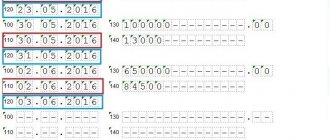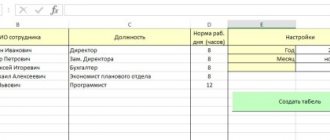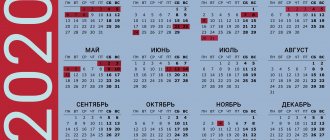Article 108. Breaks for rest and food
During the working day (shift), the employee must be given a break for rest and food lasting no more than two hours and no less than 30 minutes, which is not included in working hours.
The time for granting a break and its specific duration are established by internal labor regulations or by agreement between the employee and the employer.
(as amended by Federal Law No. 90-FZ of June 30, 2006)
At jobs where, due to production (work) conditions, it is impossible to provide a break for rest and food, the employer is obliged to provide the employee with the opportunity to rest and eat food during working hours. The list of such work, as well as places for rest and eating, are established by the internal labor regulations.
(as amended by Federal Law No. 90-FZ of June 30, 2006)
Question No. 1. Are dates from 30.03. until 04/30/2020 on weekends? What are non-working days?
All questions about the production calendar and wages for March, April and at the end of the year depend entirely on whether non-working days are days off?
The following terms are distinguished in labor legislation:
- working days (days of work according to the work schedule established for the employee in the internal labor regulations or employment contract (if the regime is established individually) in accordance with Article 100 of the Labor Code of the Russian Federation). Working time is the time during which an employee, in accordance with internal labor regulations and the terms of the employment contract, must perform labor duties, as well as other periods of time that, in accordance with the Labor Code, other federal laws and other regulatory legal acts of the Russian Federation, relate to working time (definition of Article 91 of the Labor Code of the Russian Federation),
- non-working holidays (defined in Article 112 of the Labor Code of the Russian Federation),
- weekends (weekly continuous rest, the procedure for provision and duration of which is determined by Article 110 of the Labor Code of the Russian Federation),
- non-working days (there is no definition, the use of the negative particle “not” confirms that they cannot refer to weekdays, but whether they refer to weekends is not clear. Or is this another concept that is not related to weekends),
- calendar days - days that include (by default) working and non-working days (Article 14 of the Labor Code of the Russian Federation).
Accordingly, based on this there can be two positions:
Position No. 1. Non-working days are weekends.
Position No. 2. Non-working days are not days off.
Comparative position of arguments in favor of each position:
| Characteristic | Position | Position |
| The presence of a DIRECT indication of this in the legislation | No | No |
| Availability of an indication of this in the Recommendations of the Ministry of Labor | No | Non-working days do not count as weekends (clause 3 of the Recommendations dated 03/26/2020) |
| Opportunity to get hired | Yes, Art. 113 Labor Code of the Russian Federation | There is no norm |
| Payment procedure these days | Yes, Art. 153 Labor Code of the Russian Federation | There is no norm |
That is, non-working days are not regulated in any way by the Labor Code of the Russian Federation.
The definition of types of rest time is regulated by Article 107 of the Labor Code of the Russian Federation:
Types of rest time are:
- breaks during the working day (shift);
- daily (between shifts) rest;
- weekends (weekly uninterrupted rest);
- non-working holidays;
- vacation.
In Art. 14 of the Labor Code of the Russian Federation, the term “non-working days” is used in defining how periods and terms calculated in calendar days are calculated: “terms calculated in years, months, weeks expire on the corresponding date of the last year, month or week of the period. The period calculated in calendar weeks or days also includes non-working days. If the last day of the period falls on a non-working day, then the end of the period is considered to be the next working day following it.”
Similarly, the same procedure for calculating the period is indicated in Art. 193 of the Civil Code of the Russian Federation: “If the last day of the period falls on a non-working day, the end of the period is considered to be the next working day.”
Based on the Law of the Russian Federation on the amendment to the Constitution of the Russian Federation dated March 14, 2020 N 1-FKZ, Decree of the President of the Russian Federation dated March 17, 2020 N 188, a non-working day would have been (if it had not been postponed) April 22, 2020 - the day of the all-Russian vote on the approval of changes to the Constitution of the Russian Federation.
Non-working days are not provided for in the production calendars developed annually, even when a non-working holiday is moved to other days that would be working days.
The ultimate truth is now in the question: whether “non-working days” are “weekends” or not - it is impossible to formulate without a direct answer to this in regulations.
You can only choose your position in which you will build all processes in your company on the dates from 03/30/2020 to 04/30/2020, since there is no direct indication in the current legislation that “non-working days are not days off”, or “Non-working days are weekends.”
Explanatory letters from the Ministry of Labor are not a normative act.
Therefore, we offer you two options for interpreting this term, based on which the answer will flow, for example, to one of the most pressing questions now, whether it is possible to attract employees to work on non-working days and pay them.
| Position No. 1. Non-working days are weekends. Reason: the absence of a term in labor legislation and the use of an analogy of the law (Article 106 of the Labor Code of the Russian Federation), which means that this is the time during which the employee is free from performing labor duties and which he can use at his own discretion. The logic is simple: on weekdays, the employee is obliged to fulfill his duties, on weekends, he manages his own time and does not work. When attracting workers to work on these days, payment must be made as for work on a day off in accordance with Article 153 of the Labor Code of the Russian Federation - no less than double the amount. To be recruited to work on these non-working days, it is necessary to follow the procedure established for recruitment to work on weekends - obtain the written consent of the employee, issue an order and have good reasons for such involvement. Considering the purposes for which this Decree was introduced (in order to ensure the sanitary and epidemiological well-being of the population on the territory of the Russian Federation and in accordance with Article 80 of the Constitution of the Russian Federation), it is in any case not recommended to attract workers on these days unless absolutely necessary. Position No. 2. Non-working days are days when the employee does not work, but they are not days off. Reason: absence of a term in labor legislation, including the lack of classification of non-working days as weekends or rest time under Art. 107 of the Labor Code of the Russian Federation. The Ministry of Labor in its clarification dated March 26, 2020 “Recommendations to employees and employers in connection with Decree of the President of the Russian Federation of March 25, 2020 No. 206 “On declaring non-working days in the Russian Federation” (see paragraph 3 of the Recommendations) indicated: “Non-working day does not apply to weekends or non-working holidays, so payment is made as usual, and not in an increased amount.” In this case, it is obvious that the Ministry of Labor is commenting on the issue of remuneration for those who fall under the exceptions in the Presidential Decree and continue to operate from 03/30/2020 to 04/30/2020. If “non-working days are not days off, they are non-working days,” then with this interpretation of the term, the involvement of workers on these days cannot be carried out for those categories that do not fall under the exceptions provided for by the Presidential Decree, since this would be a direct violation of the requirements of the current legislation. This possibility is not provided for in Art. 113 of the Labor Code of the Russian Federation and violates the meaning of providing this guarantee under the Decrees of the President of the Russian Federation. |
Thus, issues of wages cannot arise on these days, since either your employees belong to the category of those who work on the dates from 03/30/2020 to 04/30/2020 and they are paid in the usual manner, or they do not work for They retain their wages stipulated by the remuneration systems of a particular employer.
Which interpretation option is more beneficial for the employer in the situation of the current legal “hole”?
| Lawyer's opinion | Expert opinion |
| By analogy with the law, relate the term “non-working day” to the concept of “day off”, paying for such work in the amount established by Art. 153 of the Labor Code of the Russian Federation - no less than double the amount, for those categories that do not fall under the exceptions of the Presidential Decree and for which the period from March 30. until 04/30/2020 are non-working days, at least until the release of a regulatory act that will establish a different procedure. The issuance of such an act cannot be excluded given the emergency situation and the need to relieve the burden on the employer in connection with the measures being introduced. If employees fall under the restrictions established by Presidential Decrees and for them the period from March 30 to April 30, 2020 are regular working days, payment for work occurs in the usual single manner provided for by the remuneration system. | Turn a blind eye to the controversial terms and their content. Apply the recommendations of the Ministry of Labor to the extent that “non-working days” are some kind of “non-working days” and they are not days off. Accordingly, all employees work either:
Disadvantages: they are here and they need to be assessed: employees can later make claims (and potentially regulatory authorities) that, by the Presidential Decree, your company should not have worked and, accordingly, work and payment at a single rate violates the rights of employees. That is, employees entitled to this were not provided with guarantees according to the Presidential Decree - not to work and receive their wages, or that they were illegally recruited to work on weekends and they had to be paid double in accordance with Art. 153 of the Labor Code of the Russian Federation. Recommended: Justify in an internal order (employer's decision) single-rate remuneration on the basis that:
|
Article 109. Special breaks for heating and rest
For certain types of work, it is envisaged that employees will be provided with special breaks during working hours, determined by the technology and organization of production and labor. The types of these works, the duration and procedure for providing such breaks are established by the internal labor regulations.
(as amended by Federal Law No. 90-FZ of June 30, 2006)
Employees working in the cold season in the open air or in closed, unheated rooms, as well as loaders engaged in loading and unloading operations, and other workers, if necessary, are provided with special breaks for heating and rest, which are included in working hours. The employer is obliged to provide premises for heating and rest of employees.
The procedure for inviting employees to work on a holiday or day off.
Work on weekends and non-working holidays is prohibited, except in cases provided for by the Labor Code of the Russian Federation (Article 113 of the Labor Code of the Russian Federation). Employees are invited to work on such days with their written consent and by written order of the employer.
Without consent, it is allowed to involve employees to work on weekends and holidays in the following cases:
1) to prevent a catastrophe, industrial accident or eliminate their consequences;
2) to prevent accidents, destruction or damage to the employer’s property, state or municipal property;
3) to perform work the need for which is due to the introduction of a state of emergency or martial law, as well as urgent work in emergency circumstances.
Creative workers of the media, cinematography organizations, television and video crews, theaters, etc., involved in the creation and (or) performance of works, are allowed to work on weekends in the manner established by the collective agreement, local regulations, or employment contracts.
Article 111. Weekends
All employees are provided with days off (weekly continuous rest). With a five-day work week, employees are given two days off per week, and with a six-day work week - one day off.
The general day off is Sunday. The second day off in a five-day work week is established by a collective agreement or internal labor regulations. Both days off are usually provided in a row.
(as amended by Federal Law No. 90-FZ of June 30, 2006)
For employers whose work suspension on weekends is impossible due to production, technical and organizational conditions, days off are provided on different days of the week in turn to each group of employees in accordance with the internal labor regulations.
(as amended by Federal Law No. 90-FZ of June 30, 2006)
Article 112 of the Labor Code of the Russian Federation. Non-working holidays
1. Part 1 of Article 112 of the Labor Code of the Russian Federation establishes a list of holidays and non-working days on the territory of the Russian Federation.
In order to ensure that each employee has the opportunity to annually use 12 non-working holidays in addition to weekends, Part 2 of the commented article provides for a rule on transferring a day off that coincides with a holiday to the next working day after the holiday. This rule should also apply when the day off, which the employee is entitled to in accordance with the internal labor regulations, coincides with a non-working holiday. In case of such a coincidence, the employee’s day off will be the next working day after the holiday.
The transfer of days off that coincide with non-working holidays should also be carried out in organizations that apply different work and rest regimes, in which work is not carried out on holidays. This applies equally to work modes with both permanent days off and “sliding” days of rest.
According to established practice, in cases where the work and rest regime provides for work on non-working holidays (in continuously operating organizations or those associated with daily services to the population, round-the-clock duty, etc.), the rule on the transfer of days off does not apply (clarification of the Ministry of Labor of Russia dated 29 December 1992 N 65 “On some issues arising in connection with the transfer of days off that coincide with holidays” // BNA RF. 1993. N 3).
2. Part 3 of the commented article provides for the payment to employees, with the exception of those receiving a salary (official salary), of additional remuneration for non-working holidays on which they were not involved in work. The amount and procedure for payment of the specified remuneration are determined by the collective agreement, agreements, local regulations adopted taking into account the opinion of the elected body of the primary trade union organization, and an employment contract. At the same time, it is specifically stated that the amount of expenses for the payment of additional remuneration for non-working holidays relates to labor costs in full. Thus, the legislator not only established the payment of remuneration for non-working holidays on which employees were not involved in work, but also provided an additional guarantee for such payment by determining the source of financing.
3. An additional guarantee is provided for employees receiving a salary (official salary). In accordance with Part 4 of Article 112 of the Labor Code of the Russian Federation, the presence of non-working holidays in a calendar month is not grounds for reducing their wages. In other words, for employees receiving a salary (official salary), their wages in a calendar month are retained in full, regardless of the number of non-working holidays in that month.
4. Part 5 of Article 112 of the Labor Code of the Russian Federation gives the right to the Government of the Russian Federation to postpone weekends to other days, adding them to the nearest non-working days, for the purpose of rational use by employees of weekends and non-working holidays. At the same time, it is clarified that the regulatory legal act of the Government of the Russian Federation on the transfer of weekends to other days in the next calendar year is subject to official publication no later than a month before the start of the corresponding calendar year. The adoption of normative legal acts on the transfer of days off to other days during the calendar year is permitted subject to the official publication of these acts no later than 2 months before the calendar date of the established day off. This clarification allows both employees and employers to plan in advance appropriate activities related to the organization of work and rest.
In cases where, in accordance with a decision of the Government of the Russian Federation, a day off is transferred to a working day, the duration of work on this day (former day off) must correspond to the duration of the working day to which the day off was transferred (clarification of the Ministry of Labor of Russia dated February 25, 1994 No. 4 , approved by Resolution of the Ministry of Labor of Russia dated February 25, 1994 N 19 // BNA RF. 1994. N 5).
Salary.
The procedure for remuneration on a day off or a non-working holiday is established by Art. 153 Labor Code of the Russian Federation. According to general rules, work on such days is paid at least twice as much:
- for piece workers - at no less than double piece rates;
- employees whose work is paid at daily and hourly tariff rates - in the amount of at least double the daily or hourly tariff rate;
- for employees receiving a salary (official salary) - in the amount of at least a single daily or hourly rate (part of the salary for a day or hour of work) in addition to the salary, if work on a weekend or non-working holiday was carried out within the monthly working time norm, and in the amount at least double the daily or hourly rate (part of the salary for a day or hour of work) in addition to the salary if the work was performed in excess of the monthly working time standard.
The presence of non-working holidays in a calendar month is not grounds for reducing wages for salaried employees.
Payment for work on a weekend or holiday for creative workers specified in the List of professions and positions of creative workers in the media, cinematography organizations, television and video film crews, theaters, theatrical and concert organizations, circuses and other persons involved in the creation and (or) performance (exhibition) of works[1], is determined by a collective agreement, local act, or employment contract.
All employees are paid at an increased rate for hours actually worked on a weekend or non-working holiday. If part of the working day (shift) falls on a weekend or holiday, the hours actually worked on the weekend or non-working holiday (from 0 to 24 hours) are paid at an increased rate.
At the request of the employee, instead of increased pay, he may be given another day of rest (time off). We'll talk about this a little later.
So, let’s consider in order the algorithm for calculating wages for working on a weekend or holiday.
Compensation for work on a non-working holiday
The Federal Service for Labor and Employment reminds that labor legislation guarantees employees two types of compensation for working on a non-working holiday - wages of at least double the amount or an additional day of rest.
As a general rule, for work on a non-working holiday, which is a type of work in conditions deviating from normal, the employee is entitled to appropriate payments provided for by labor legislation and other regulatory legal acts, a collective agreement, agreements, local regulations, and an employment contract. Moreover, their size cannot be lower than those established by labor legislation (Article 149 of the Labor Code of the Russian Federation).
The minimum amount of additional payments is established by Part 1 of Art. 153 of the Labor Code of the Russian Federation in the following sizes:
- piece workers - no less than double piece rates;
- employees whose work is paid at daily and hourly tariff rates - in the amount of at least double the daily or hourly tariff rate;
- employees receiving a salary (official salary) - in the amount of at least a single daily or hourly rate (part of the salary (official salary) for a day or hour of work) in excess of the salary (official salary), if work on a day off or a non-working holiday was carried out on within the limits of the monthly working time standard, and in an amount of at least double the daily or hourly rate (part of the salary (official salary) for a day or hour of work) in excess of the salary (official salary), if the work was performed in excess of the monthly working time standard.
Arbitrage practice. In the Appeal ruling of the Moscow City Court dated 06/04/2013 in case No. 11-15193, the court, among other things, ordered the employer to recalculate wages, pay for work on weekends according to work schedules in shift work in accordance with Part 1 of Art. 153 of the Labor Code of the Russian Federation and accrue interest in accordance with Art. 236 Labor Code of the Russian Federation.
The second compensation option is to provide the employee with an additional day of rest, the so-called time off. But the Employer does not have the right to provide an employee with a day of rest instead of increased pay without his written consent
. If the employee does not mind, then work on a day off or a non-working holiday is paid in a single amount, and a day of rest is not subject to payment (Part 3 of Article 153 of the Labor Code of the Russian Federation).
As Rostrud noted, paying a single day off means that an employee receiving a salary is paid a single daily rate on top of it. In addition, in the month when a day of rest is used, wages (salary) are not reduced. It does not matter whether the employee takes a day of rest in the current month or in subsequent ones.
Arbitrage practice. The Supreme Court of the Russian Federation, in its Decision dated 02/08/2006 N GKPI05-1644 regarding the conditions of remuneration and the provision of another day of rest for work on a day off or a non-working holiday, confirmed that, according to Art. 153 of the Labor Code of the Russian Federation, such work must be paid for at least double the amount. At the same time, the employee has the right to use another day of rest for working on a weekend or non-working holiday. In this case, work on a non-working holiday is paid in a single amount, and the day of rest is not subject to payment. Moreover, as the court pointed out, the requirements of Art. 153 of the Labor Code of the Russian Federation also applies to employees working in organizations with shift work.
A similar point of view was previously voiced by both the Russian Ministry of Labor and Rostrud (see Letters of the Russian Ministry of Labor dated March 11, 2013 N 14-2/3019144-1157 and Rostrud dated February 18, 2013 N PG/992-6-1).
There are two exceptions to this order:
— in relation to certain categories of creative workers, the procedure for payment for work on non-working holidays can be determined on the basis of a collective agreement, a local regulatory act, or an employment contract (Part 4 of Article 153 of the Labor Code of the Russian Federation);
- for employees who have entered into an employment contract for a period of up to two months, compensation is provided only in cash - no less than double the amount (Article 290 of the Labor Code of the Russian Federation).
Particular attention should be paid to the procedure for providing compensation to personnel in continuously operating enterprises (shops, sections, units), as well as when recording working hours in aggregate. In this case, special rules apply, established by the Resolution of the State Committee of Labor of the USSR, the Presidium of the All-Union Central Council of Trade Unions dated 08.08.1966 N 465/P-21 “On approval of Explanation No. 13/p-21 “On compensation for work on holidays” (hereinafter referred to as the Explanation). Despite the fact that the act was adopted back in Soviet times, according to Art. 423 of the Labor Code of the Russian Federation, it applies to the extent that does not contradict the Labor Code of the Russian Federation. What does the Clarification say? In continuously operating enterprises (shops, sections, units), as well as in the case of cumulative recording of working hours, work on holidays is not compensated for by another day off if it is included in the monthly working time standard
. If work on a holiday was not included in the standard working hours, then the rules apply as for normal working hours: at the request of the employee, instead of increased pay, he may be given another day of rest, and payment will be made in a single amount (clause p. 1 and 3).
In addition, as noted above, Guarantees of increased pay apply to all employees regardless of working hours
(five-day work week, shift work, etc.). Therefore, double payment is made to all employees for the hours actually worked on the holiday. When part of a work shift falls on a holiday, the hours actually worked on the holiday are paid at double the rate - from 0 to 24 hours (clause 2 of the Explanation).
Personnel workers should remember that when calculating overtime hours, work on holidays performed in excess of normal working hours should not be taken into account, since it has already been paid double (clause 4 of the Explanation, Decision of the Supreme Court of the Russian Federation dated November 30, 2005 N GKPI05-1341 , Ruling of the Moscow City Court dated January 17, 2012 in case No. 4g/2-11787/11).
For your information. Employers will have to provide an additional day of rest not only for work, but also for performing socially significant functions on non-working holidays. For example, if an employee donates blood and its components on a non-working holiday (Part 3 of Article 186 of the Labor Code of the Russian Federation). At the same time, the employer retains for the employee his average earnings both for the day of delivery and for the days of rest provided in connection with this (Part 5 of Article 186 of the Labor Code of the Russian Federation).









